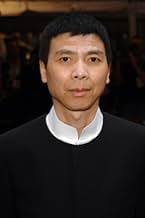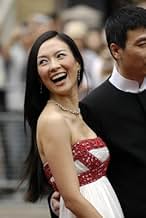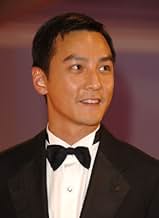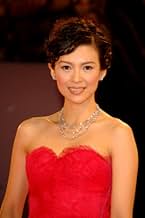NOTE IMDb
6,4/10
7,3 k
MA NOTE
Au Xᵉ siècle, en Chine, l'empereur est assassiné par Li, son propre frère. Prenant le pouvoir, il épouse sa belle-sœur, Wan, à qui on ne laisse le choix. Celle-ci, aidée par son bien-aimé, l... Tout lireAu Xᵉ siècle, en Chine, l'empereur est assassiné par Li, son propre frère. Prenant le pouvoir, il épouse sa belle-sœur, Wan, à qui on ne laisse le choix. Celle-ci, aidée par son bien-aimé, le prince héritier Wu Luan, décide de se venger.Au Xᵉ siècle, en Chine, l'empereur est assassiné par Li, son propre frère. Prenant le pouvoir, il épouse sa belle-sœur, Wan, à qui on ne laisse le choix. Celle-ci, aidée par son bien-aimé, le prince héritier Wu Luan, décide de se venger.
- Réalisation
- Scénario
- Casting principal
- Récompenses
- 10 victoires et 25 nominations au total
Yanbin Liu
- Messenger
- (as Liu Yanbin)
Avis à la une
The women' death is because of the love.
The men' death is because of the women.
Desire is the measure, is the excuse.
Finally, desire is defeated to the love and the death.
In this war, the winner is
Beautiful clothes, lovely music and song, strange marks, tragedy character, moving story. It shows you that what Chinese' value is, what the love is, what the human' heart is. You will think deeply from your heart, you may understand the different among the cultures to express the familiar story. Think about Hamlet.
People don't understand each other, if they do, there is no one alone.
The men' death is because of the women.
Desire is the measure, is the excuse.
Finally, desire is defeated to the love and the death.
In this war, the winner is
Beautiful clothes, lovely music and song, strange marks, tragedy character, moving story. It shows you that what Chinese' value is, what the love is, what the human' heart is. You will think deeply from your heart, you may understand the different among the cultures to express the familiar story. Think about Hamlet.
People don't understand each other, if they do, there is no one alone.
This is a very well made production of an epic story placed in 10th century China. Magnificent scenes of ritual, majestic scenery, beautiful landscapes, great stage design, artful choreography and above all a very good sense of the theatrical that echos ancient Greek Tragedy. One thing that seems to be wearing out in Chinese movies of this kind are the long violently cruel scenes that are attempted to be beautified and the ongoing fighters who fly allover. In a choreographic sense they are of great merit but a lot is unnecessary. Zhang Ziyi is one more good reason to see this movie. I found her convincing in her role although somewhat stiff. I would like to see more of her in the future, more such great productions with even less fighting and more content that Chinese culture can easily provide.
It's an oriental kung fu Hamlet.
Everyone's been saying it's loosely based on Shakespeare's tragedy, and to some, the movie's indeed a tragedy with its slowness in pace and lack of action, but I'd like to see it as because of its heavy reference to Hamlet (the poisoned quill, and many other plot points and scenes), it sort of created a crutch on which to lean the movie upon, hence the familiarity to some, therefore having the source serving as a double edged sword - the movie beholden to it and eventually ending it on a weak note.
Having inherited the creative team of Yuen Wo Ping (action choreography), Tan Dun (Music), Tim Yip (Art Direction), and the starlet in Ziyi Zhang (wonder why the westernized juxtaposition of her name) does not automatically replicate the success of Crouching Tiger Hidden Dragon that easily. It's the X-factor and the blending of elements of novelty in CTHD that made it a huge success, and blindly following the predetermined formula is akin to hammering a square peg into a round hole.
While the art direction is lush and everything looking adequately regal, somehow Tan Dun's music seemed to be muted throughout the movie, only exhibiting sporadic brilliance to drum up scenes with the soundtrack, or the hauntingly beautiful theme song. The major disappointment however, will be in the fighting scenes. Here, martial arts both function as a contrast to the much muted artsy style of the Hamlet here, Prince Wu Luan (Daniel Wu), highlighting the difference in power between the pen and the sword, as well as functioning as foreplay. I thought with the gratuitous fake blood spewing across the screen, it was kind of a homage to 70s Shaw Bros martial arts classics, and a nod to director Chang Cheh, the king of ketchup blood. The initial big sequenced battle scene might have whet appetites, but sadly subsequent battles do not match up, with its repetitive running up walls or in mid air, as if Yuen had run out of tricks in the wire-work manual, having at one point seemed to copy Tsui Hark's Dao (1995). There's one moment of innovation though in a scene of punishment not seen (at least to me) before.
But not that I'm complaining. If this martial arts in this movie is viewed without comparisons to other more recent fantasy martial arts movies like Hero and House of Flying Daggers, it is still enjoyable and beautifully choreographed, and surpasses The Promise by a huge mile. Just that it lacked a fresh look in battles, and the unimaginative costuming of the Imperial Guards didn't help, looking too close like distant cousins of Lord of the Ring's Nazguls / Ringwraiths / Black Riders.
Desire as a theme runs through the movie very strongly, the desire for love, endless power and pure, unadulterated revenge. Very briefly, the story by now will be fairly obvious with Emperor Li (Ge You) usurping the throne from his brother, and coverts his wife Empress Wan as his own, who at one point in time was Prince Wu Luan's old flame. The Prince here is a fellow in love with the arts and bent on avenging his father, and who is the subject of unrequited love by the daughter of a minister - Qing Nu (Zhou Xun).
It's all about the wearing of masks and the building of facades, of hiding true intentions to achieve personal objectives. The contrast between the two men in the Emperor and the Prince is looked into, their love lives examined - one who uses power to obtain love, while the other's fortune to be loved brought him unimaginable influence.
Despite its references to Hamlet, the focus of the movie here seemed to be Ziyi Zhang's Empress Wan, as she plots and schemes, leaving you perplexed as to whether to sympathize and pity her, or applaud her attempts at exacting her own brand of justice. Acting all round is nothing to rave about, and though Ge You's performance seemed the better of the lot, his measured, subtle ways as the Emperor comes off rather weakly as a man capable of scheming to get to where he is. Somehow, I thought that Hamlet allowed the acting to take a foot off the pedal as audiences would already put in place perceptions and direct translations of character for character.
All said, The Banquet is still a reasonably competent foray into the martial arts genre for director Feng Xiaogang, and if he were to put another movie from the genre out, I'll sure be there to watch it. Now to anticipate Zhang Yimou's next contribution to the genre.
Everyone's been saying it's loosely based on Shakespeare's tragedy, and to some, the movie's indeed a tragedy with its slowness in pace and lack of action, but I'd like to see it as because of its heavy reference to Hamlet (the poisoned quill, and many other plot points and scenes), it sort of created a crutch on which to lean the movie upon, hence the familiarity to some, therefore having the source serving as a double edged sword - the movie beholden to it and eventually ending it on a weak note.
Having inherited the creative team of Yuen Wo Ping (action choreography), Tan Dun (Music), Tim Yip (Art Direction), and the starlet in Ziyi Zhang (wonder why the westernized juxtaposition of her name) does not automatically replicate the success of Crouching Tiger Hidden Dragon that easily. It's the X-factor and the blending of elements of novelty in CTHD that made it a huge success, and blindly following the predetermined formula is akin to hammering a square peg into a round hole.
While the art direction is lush and everything looking adequately regal, somehow Tan Dun's music seemed to be muted throughout the movie, only exhibiting sporadic brilliance to drum up scenes with the soundtrack, or the hauntingly beautiful theme song. The major disappointment however, will be in the fighting scenes. Here, martial arts both function as a contrast to the much muted artsy style of the Hamlet here, Prince Wu Luan (Daniel Wu), highlighting the difference in power between the pen and the sword, as well as functioning as foreplay. I thought with the gratuitous fake blood spewing across the screen, it was kind of a homage to 70s Shaw Bros martial arts classics, and a nod to director Chang Cheh, the king of ketchup blood. The initial big sequenced battle scene might have whet appetites, but sadly subsequent battles do not match up, with its repetitive running up walls or in mid air, as if Yuen had run out of tricks in the wire-work manual, having at one point seemed to copy Tsui Hark's Dao (1995). There's one moment of innovation though in a scene of punishment not seen (at least to me) before.
But not that I'm complaining. If this martial arts in this movie is viewed without comparisons to other more recent fantasy martial arts movies like Hero and House of Flying Daggers, it is still enjoyable and beautifully choreographed, and surpasses The Promise by a huge mile. Just that it lacked a fresh look in battles, and the unimaginative costuming of the Imperial Guards didn't help, looking too close like distant cousins of Lord of the Ring's Nazguls / Ringwraiths / Black Riders.
Desire as a theme runs through the movie very strongly, the desire for love, endless power and pure, unadulterated revenge. Very briefly, the story by now will be fairly obvious with Emperor Li (Ge You) usurping the throne from his brother, and coverts his wife Empress Wan as his own, who at one point in time was Prince Wu Luan's old flame. The Prince here is a fellow in love with the arts and bent on avenging his father, and who is the subject of unrequited love by the daughter of a minister - Qing Nu (Zhou Xun).
It's all about the wearing of masks and the building of facades, of hiding true intentions to achieve personal objectives. The contrast between the two men in the Emperor and the Prince is looked into, their love lives examined - one who uses power to obtain love, while the other's fortune to be loved brought him unimaginable influence.
Despite its references to Hamlet, the focus of the movie here seemed to be Ziyi Zhang's Empress Wan, as she plots and schemes, leaving you perplexed as to whether to sympathize and pity her, or applaud her attempts at exacting her own brand of justice. Acting all round is nothing to rave about, and though Ge You's performance seemed the better of the lot, his measured, subtle ways as the Emperor comes off rather weakly as a man capable of scheming to get to where he is. Somehow, I thought that Hamlet allowed the acting to take a foot off the pedal as audiences would already put in place perceptions and direct translations of character for character.
All said, The Banquet is still a reasonably competent foray into the martial arts genre for director Feng Xiaogang, and if he were to put another movie from the genre out, I'll sure be there to watch it. Now to anticipate Zhang Yimou's next contribution to the genre.
I'm a big fan of Chinese movies, Ziyi Zhang and Shakespeare, so I was definitely looking forward to this movie. The story is inspired by Shakespeare's Hamlet and does an excellent job of translating the classic to an historic setting at the end of the Tang dynasty. I especially enjoyed the reinterpretation of Hamlet's mother as Prince Wu Luan's former lover (there was always something uncomfortably incestuous in Shakespeare's original). The acting is superb with kudos to both Ziyi Zhang and You Ge for creating a pair of very complex characters as Empress and Emperor. Some of the dialog is poetic in spite of not being Shakespearean. The sets were sumptuous. And Qing Nu's song at the end was beautiful!
So where did it go wrong? Except for Qing's song, the rest of the music was annoyingly obtrusive. Most of the action scenes were stylized and shot in slow motion. And many times the annoying music was playing during the slow motion action sequences, which effectively doubled the annoyance. Only the Prince's "audition" was a meaningful, well constructed action sequence. Finally, it could have been edited better with the movie reduced by about 15 minutes. There were several scenes that just didn't make sense. For example, there is a beautiful shot of Empress Wan entering the water naked, but it has no relation to what came before or after (ok, maybe that scene doesn't need context, but it just seemed out of place).
Overall, a decent movie with flashes of brilliance but having one too many flaws to rank any higher.
So where did it go wrong? Except for Qing's song, the rest of the music was annoyingly obtrusive. Most of the action scenes were stylized and shot in slow motion. And many times the annoying music was playing during the slow motion action sequences, which effectively doubled the annoyance. Only the Prince's "audition" was a meaningful, well constructed action sequence. Finally, it could have been edited better with the movie reduced by about 15 minutes. There were several scenes that just didn't make sense. For example, there is a beautiful shot of Empress Wan entering the water naked, but it has no relation to what came before or after (ok, maybe that scene doesn't need context, but it just seemed out of place).
Overall, a decent movie with flashes of brilliance but having one too many flaws to rank any higher.
It has long bothered me that Feng Xiaogang's movies don't get U.S. releases...and so I have had to make a habit of getting them sent to me from overseas or other equally inconvenient means. Having discovered his movies while living in China several years ago, I have been eagerly awaiting the release of Ye Yan and watching its progress through "pre-production" notes on IMDb. I was a little intrepid--one of the elements I love about Feng Xiaogang's movies is their ability to create inordinate beauty in contemporary settings that many would not see the beauty in...and I knew this was to be a film of another era. (In truth, I feared a little that Feng was going the way of Zhang YiMou--from the extraordinary into the traditional, beautiful, but traditional.) But I also love Feng's cultural, historical, and linguistic layering--and what better basis for that can their be but Hamlet? (Noting for fairness sake that I am an English Professor, and love Hamlet above all other Elizabethan dramas.) However, this film is, while traditional in setting, still extraordinary. The use of masks and movement play with Shakespearean notions of the play within the play/all the world's a stage. And, for me at least, this is the most impressive layer of the film. The story is well done; though one should not watch it as a "version" of Hamlet, but rather as "inspired by" Hamlet. Both Ye Yan and Hamlet address political, cultural and social issues through the story, but their issues are not identical. At this point, I would say this is my second favorite Feng Xiaogang film--only behind Tian Xia Wu Zei--but oh how I wish they would all be released in America. I read in the trivia of this web page that Ye Yan will be nominated for the Oscars and I hope this is true......mostly on the off chance that if it wins--despite the American public not seeing it--that it will lead to some of Feng Xiaogang's movies getting an American release.
Le saviez-vous
- AnecdotesBoth Gong Li and Maggie Cheung were originally considered playing the queen's role. When Ziyi Zhang took over the part, the script was rewritten to make the character younger.
- ConnexionsReferenced in Panel Quiz Attack 25: Épisode datant du 10 juin 2007 (2007)
Meilleurs choix
Connectez-vous pour évaluer et suivre la liste de favoris afin de recevoir des recommandations personnalisées
Détails
- Date de sortie
- Pays d’origine
- Sites officiels
- Langue
- Aussi connu sous le nom de
- The Banquet
- Lieux de tournage
- Inner Mongolia, Chine(A'er Mountain)
- Sociétés de production
- Voir plus de crédits d'entreprise sur IMDbPro
Box-office
- Budget
- 15 000 000 $US (estimé)
- Montant brut mondial
- 22 598 772 $US
- Durée
- 2h 11min(131 min)
- Couleur
- Mixage
- Rapport de forme
- 2.35 : 1
Contribuer à cette page
Suggérer une modification ou ajouter du contenu manquant




















